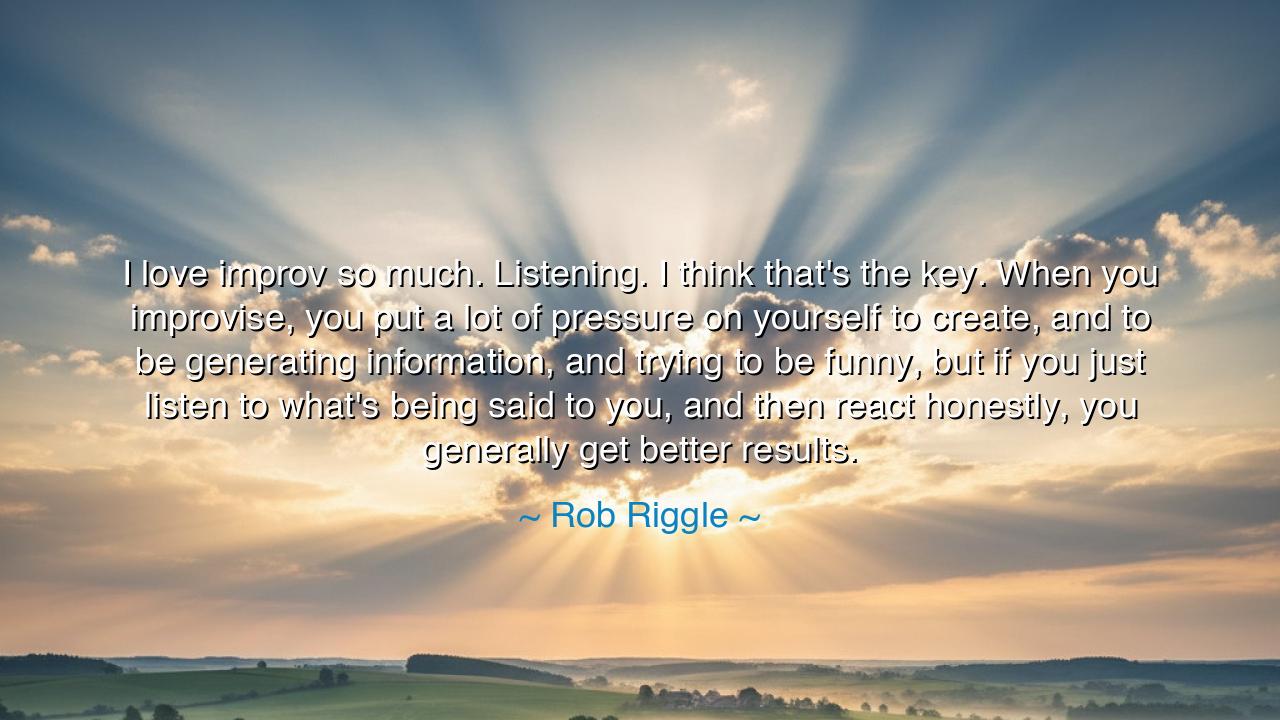
I love improv so much. Listening. I think that's the key. When
I love improv so much. Listening. I think that's the key. When you improvise, you put a lot of pressure on yourself to create, and to be generating information, and trying to be funny, but if you just listen to what's being said to you, and then react honestly, you generally get better results.






The words, “I love improv so much. Listening. I think that's the key. When you improvise, you put a lot of pressure on yourself to create, and to be generating information, and trying to be funny, but if you just listen to what's being said to you, and then react honestly, you generally get better results,” were spoken by Rob Riggle, the comedian and actor whose humor, discipline, and experience—both as a Marine and a performer—embody a rare balance of heart and precision. In this reflection, Riggle reveals a truth that transcends the stage. Though he speaks of improv, he is truly speaking of life: that mastery is born not from force or control, but from presence, and that the art of listening is the root of all genuine creation.
To the ancients, this wisdom would have resonated as the teaching of both philosopher and warrior. The Greeks spoke of sophrosyne, the harmony of mind and spirit that allows one to respond rather than to react. Riggle’s insight—that to listen and respond honestly yields better results than to strain for cleverness—is the very essence of that virtue. In improv, as in life, many try too hard to create—to impose their will upon the moment, to be the funniest, the smartest, the most impressive. Yet the greatest art is not forced; it emerges naturally when one is attuned to the world around them. The ancient masters knew that to listen deeply is to enter into harmony with reality itself, where one’s words and actions flow like water following the path of truth.
Riggle speaks from experience not just as a performer but as a student of human connection. The art of improvisation is the art of trust—trusting one’s partner, trusting the moment, trusting that what arises is enough. When he says, “you just listen to what’s being said to you, and then react honestly,” he gives us the key to presence. The one who listens is never lost; the one who listens is always in tune with the heartbeat of the scene, whether on stage or in conversation. In the theater of life, this lesson is eternal: those who seek only to speak, to impress, or to control will falter; but those who listen will find the rhythm of truth, and from that rhythm, wisdom and laughter both are born.
Consider the story of the ancient samurai, who were taught that victory did not come from aggression, but from stillness and awareness. The greatest warrior, it was said, could anticipate his opponent not by guessing, but by listening—not merely with his ears, but with his entire being. He listened to the air, to the faint movement of the blade, to the breath before the strike. His strength was not in creation, but in perception. Likewise, in the world of performance, the improviser who listens intently can turn even silence into art. The scene flows, not because he dominates, but because he harmonizes. Riggle’s words carry this same wisdom: that power lies not in doing more, but in being more present.
There is also humility in Riggle’s reflection. “You put a lot of pressure on yourself to create,” he says—and who among us does not? In the age of constant noise and endless striving, we all feel the burden to perform, to produce, to prove our worth. But Riggle reminds us that creation is not invention—it is discovery. When we listen deeply—to others, to the world, to our own intuition—we find that meaning and humor already exist around us. We do not summon greatness; we simply uncover it. The ancients would have said that the universe itself is a kind of divine improvisation, and that our role is not to direct it, but to participate honestly.
This lesson applies not only to art, but to the way we live and love. To truly listen—to a friend in pain, to a partner in joy, to the quiet whisper of one’s conscience—is the most sacred act of attention. It transforms relationships, dissolves conflict, and opens the door to empathy. Just as in improv, where the success of the scene depends on hearing and responding truthfully, so in life do all human bonds deepen when grounded in understanding. Riggle’s teaching is therefore not only about comedy, but about compassion. For listening is love made audible, the act of honoring another’s voice without interruption or judgment.
So, my child, take this wisdom to heart: be quick to listen, and slow to speak. Whether on the stage or in the marketplace, in friendship or in battle, let your strength come from attention, not ambition. When you feel the pressure to perform, to fill the silence, to impress—pause, breathe, and listen. The moment itself will guide you, if only you have the courage to trust it.
For in the end, Rob Riggle’s words remind us of the oldest truth of all: that life, like improv, is not scripted. We cannot control the lines that are given to us, but we can choose how to respond. And if we listen—truly listen—with honesty and presence—then our every reaction becomes a work of art, our every exchange a step toward understanding. Thus, the greatest wisdom is not in speaking perfectly, but in hearing fully. For he who listens, even in silence, speaks the language of the gods.






AAdministratorAdministrator
Welcome, honored guests. Please leave a comment, we will respond soon